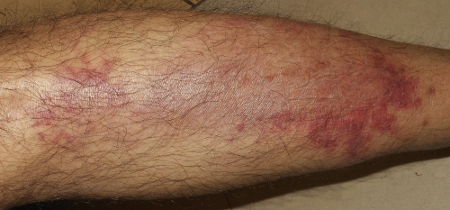Summary
Definition
História e exame físico
Principais fatores diagnósticos
- jaundice
- nonspecific upper abdominal pain or discomfort
- weight loss and anorexia
- back pain
Outros fatores diagnósticos
- age 65-74 years
- steatorrhea
- thirst, polyuria, nocturia, and weight loss
- nausea, vomiting, and early satiety
- unexplained acute pancreatitis
- hepatomegaly
- epigastric abdominal mass
- positive Courvoisier sign
- petechiae, purpura, bruising
- Trousseau sign (migratory thrombophlebitis)
Fatores de risco
- smoking
- family history of pancreatic cancer
- other hereditary cancer syndromes
- chronic sporadic pancreatitis
- diabetes mellitus
- obesity
- dietary factors
Investigações diagnósticas
Primeiras investigações a serem solicitadas
- pancreatic protocol CT
- abdominal ultrasound
- LFTs
Investigações a serem consideradas
- prothrombin time (PT)
- CBC
- cancer antigen (CA)19-9 biomarker
- positron emission tomography
- endoscopic retrograde cholangiopancreatography (ERCP)
- MRI
- magnetic resonance cholangiopancreatography
- endoscopic ultrasound
- staging laparoscopy (with laparoscopic ultrasound)
- biopsy
Novos exames
- genomic testing
Algoritmo de tratamento
resectable (stages 1 and 2)
locally advanced unresectable (stage 3)
metastatic (stage 4)
Colaboradores
Autores
Hemant M. Kocher, MBBS, MS, MD, FRCS
Professor of Liver and Pancreas Surgery
Barts Cancer Institute
Barts and The London School of Medicine and Dentistry
London
UK
Declarações
HMK is an author of a number of references cited in this topic. HMK has received research grants from Bristol-Myers-Squibb (formerly Celgene) for investigator-initiated clinical trials. HMK has unrestricted educational grants from Meril, Mylan, Medtronics, and Ethicon.
Agradecimentos
Dr Hemant M. Kocher wishes to gratefully acknowledge Dr Fieke E.M. Froeling, a previous contributor to this topic.
Declarações
FEMF is an author of a reference cited in this topic.
Revisores
Ross Carter, FRCS
Consultant Pancreatic Surgeon
West of Scotland Pancreatic Unit
Glasgow Royal Infirmary
Glasgow
UK
Declarações
Not disclosed.
Nikhil I. Khushalani, MD
Assistant Professor of Oncology
Roswell Park Cancer Institute
Buffalo
NY
Declarações
NIK has received funding for the conduction of clinical trials and associated translational studies from Merck, Pfizer, and Astra-Zeneca. NIK has a grant from the National Comprehensive Cancer Network (from research support by Roche).
Créditos aos pareceristas
Os tópicos do BMJ Best Practice são constantemente atualizados, seguindo os desenvolvimentos das evidências e das diretrizes. Os pareceristas aqui listados revisaram o conteúdo pelo menos uma vez durante a história do tópico.
Declarações
As afiliações e declarações dos pareceristas referem--se ao momento da revisão.
Referências
Principais artigos
National Comprehensive Cancer Network. NCCN clinical practice guidelines in oncology: pancreatic adenocarcinoma [internet publication].Texto completo
Conroy T, Pfeiffer P, Vilgrain V, et al. Pancreatic cancer: ESMO clinical practice guideline for diagnosis, treatment and follow-up. Ann Oncol. 2023 Nov;34(11):987-1002.Texto completo Resumo
Sohal DPS, Kennedy EB, Cinar P, et al. Metastatic pancreatic cancer: ASCO guideline update. J Clin Oncol. 2020 Aug 5:JCO2001364.Texto completo Resumo
Artigos de referência
Uma lista completa das fontes referenciadas neste tópico está disponível para os usuários com acesso total ao BMJ Best Practice.

Diagnósticos diferenciais
- Chronic pancreatitis
- Bile duct stones
- Ampullary carcinoma
Mais Diagnósticos diferenciaisDiretrizes
- NCCN clinical practice guidelines in oncology: pancreatic adenocarcinoma
- ESMO clinical practice guideline express update on the management of metastatic pancreatic cancer
Mais DiretrizesFolhetos informativos para os pacientes
Pancreatic cancer
Pancreatic cancer: questions to ask your doctor
Mais Folhetos informativos para os pacientesConectar-se ou assinar para acessar todo o BMJ Best Practice
O uso deste conteúdo está sujeito ao nosso aviso legal